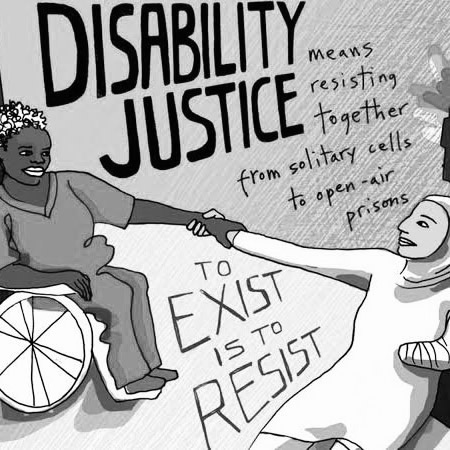Disability Justice: To Exist is to Resist - Gladys C.


Description:
The image consists of two women from different cultural and racial backgrounds with physical disabilities, sitting down and holding their hands together in solidarity. The image also has a quote that states, “Disability Justice means resisting together from solitary cells to open air prisons: To Exist Is To Resist”.
Significance:
I choose this artifact because it represents advocacy for disability justice, specifically, sexual health and well-being for women with disabilities. As an abled-bodied female, I am empowered through ableism to make my own decisions when it comes to my sexual health. (Liddiard, 2017). Women with disabilities, however, do not have the same privileges that I do. An example of this was when I started working in the disability support industry. I had worked with a female client who was taking birth control to stop her menstrual cycle because her parents felt that it was unnecessary for her because she was not sexually active. The parents are the client’s legal guardians; therefore, they are ‘entitled’ to make whatever decision they feel is best for the client. As a support worker, I felt restricted to advocate for that client because of the policies and legislations that are in place within the organisation. I also felt guilty that I have the right to make my own decisions regarding my sexual health when another female had no control over their own body. I chose this artifact because it really resonates with me, it amplifies that despite the limitations in my role as support I should not limit my abilities to advocate for sexual justice for clients with disabilities. (Turner, Vernacchio & Satterly, 2018).
Positionality:
I am interested in Disability and Sex because I wanted to gain knowledge as a support worker about how a person’s disability impacts their sexuality. Prior to learning this unit, I studied Certificate IV in Disability to gain knowledge and acquire skills on how to provide support to my clients. Under no circumstance was I educated about the sexual health and well-being of my clients, nor was I educated on how to advocate for my clients regarding their disability and sexuality. (Lee & Collins, 2018). All the information that I had gained was from the media, which profoundly desexualized disabled people. (Shuttleworth & Mona, 2020). This led me to have preconceived beliefs about disability and sexuality. I believed in the notion that people with disabilities are sexually incompetent and if they were sexually active, I felt uncomfortable because I assumed that they are “innocent” and cannot understand the concept of sex. (Tepper, 2000). This belief was directly a result of a lack of knowledge regarding disability justice, specifically disability sexual health and wellbeing. (Turner, Vernacchio & Satterly, 20218). The guidelines, policies and procedures that are enforced in the disability support industry concerning disability sexual justice are extremely controversial because they contain grey areas in which organizations can easily control how staff, parents, and clients access education and training regarding disability sexual rights and wellbeing. (Shuttleworth & Mona, 2020). As a support worker, I was illiterate regarding addressing clients’ sexuality, promoting their sexual health, and advocating for their sexual rights. (Turner, Vernacchio & Satterly, 2018).
Impact:
This unit has impacted me severely by making me understand that there is more to being support working than just attending to a client’s personal care. I am now aware that social justice consists of sexual justice and liberation. (Turner, Vernacchio & Satterly, 2018). It is my ethical responsibility as a social worker to address disability and sexual injustice as well as advocate for my client’s sexual health and well-being. (Lee, Fengre & Collins, 2017). Upon reflecting, this project makes me feel concerned for support workers and their behaviour towards clients’ sexual health. The legislation in place regarding sexual wellbeing is very restricted for clients, often the concept of risk is used as a way for organisations to avoid and neglect the client’s sexual health. (Lee, Fenge & Collins, 2017). Due to the lack of education and information about disability sexual justice, clients’ sexual rights and well-being are constantly being compromised. (Lee, Fengre & Collins, 2017). Nonetheless, this unit has effectively educated me on how social work principles, such as human dignity; client access to community and participation; rights and responsibilities; promotion of peace, are all significant when advocating for a client’s sexual health and wellbeing. (Turner, Vernacchio & Satterly, 2018). I have also gained practical knowledge on how to provide genuine support for clients’ sexual health and wellbeing with the fundamental social work values of empathy, respect, and compassion. (Turner, Vernacchio & Satterly, 2018).
Wish List:
As a support worker, most of the female clients I have worked with do not have legal rights to make decisions over their own bodies, especially regarding their sexual well-being. Family members often choose to do what they feel is best for the clients, including making decisions about their sexual reproductive health as well as denying clients access to sexual well-being education. (Gomez et al., 2020). I hope that my artifact inspires viewers to take the following action of empathising, providing support and advocating for women with a disability and their sexual justice. I hope that my artifact makes people think about how they can effectively promote sexual justice regarding disability sexual well-being and question the ethical and moral legislations currently surrounding sexual health with women with disabilities. I hope that abled-bodied viewers can reflect on their privilege to be able to be sexual citizens – despite their intersectionality or the marginalised group that they identify with – they can view disability sexual justice as a global human rights issue that requires advocacy and effective reformations.
Comments are closed.



One Comment
I really appreciate the overriding theme of solidarity in this submission. I think it ties back to the ‘Crip camp’ documentary and how there is power within solidarity and numbers. I think it is very powerful that you note that although you have limitations in your role as a support worker, that does not limit your ability to advocate for people with disabilities. This links back to a reading by Burnes (2017) that touches on sex-positive counselling frameworks being a critical aspect of the support system which is more often than not overlooked. I think you advocating for the sexual rights of disabled people is a major step forward. I really enjoyed reading this post and think you have represented some very important ideas in the world of disability and sex. Well done, Gladys!